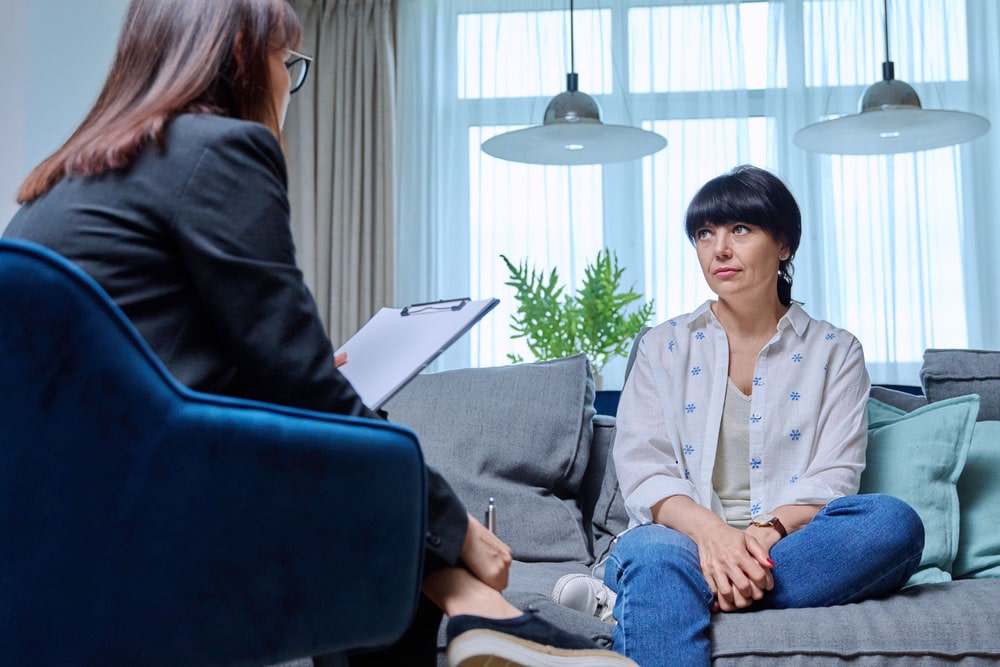Is it possible to love and be loved while struggling with addiction? This question plagues many relationships where substance abuse takes center stage, overshadowing the emotional connection between partners. In this blog post, we’ll explore the hard truth about why an addict can’t love you and the typical addict behavior in relationships. We’ll delve into the challenges of codependency, mental health issues, and the journey to recovery. By understanding these complexities, couples can work together to rebuild their emotional connection and create a healthier, more loving relationship.
If you or a loved one need help now call 772-774-3872.
Key Takeaways
- Addiction has a destructive effect on relationships, leading to emotional disconnection and abuse.
- Fear of intimacy can limit an individual’s ability to form meaningful connections with others, while codependency and enabling behaviors can lead to detrimental effects.
- Mental health issues often coexist with addiction, complicating recovery efforts. Couples must commit to rebuilding trust and emotional intimacy through communication and support resources for lasting success.
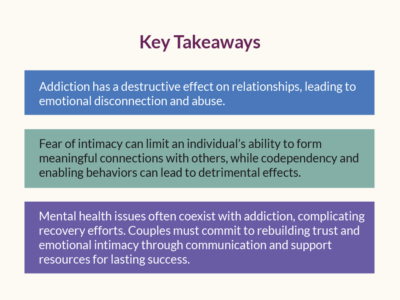
The Struggle for Emotional Connection in Addictive Relationships
Establishing and maintaining healthy relationships is a challenge for anyone, but it becomes even more difficult when substance abuse, such as alcohol abuse, is involved. Addiction has a profound detrimental effect on relationships, often leading to emotional, physical, and psychological abuse. The consequences of substance addiction can be multifaceted, and the negative consequences can ripple through the lives of both the addicted person and their loved ones.
The addicted person may experience feelings of guilt, shame, and isolation, while their loved ones and drug addicts around them may also be affected.
Emotional Unavailability
Emotional unavailability is a state in which an individual is unable to form or maintain meaningful relationships due to their preoccupation with drug abuse or alcohol. Addicted individuals often struggle with this issue, as their primary focus becomes obtaining and using drugs or alcohol, rather than nurturing their relationships.
This emotional distance creates a void in the relationship, making it difficult for the partner to feel loved and supported. However, understanding the root cause of emotional unavailability and seeking professional assistance can help both partners work through this barrier and rebuild their connection.
Fear of Intimacy
Addicts often experience a fear of intimacy, which impedes their ability to love and be loved in romantic relationships. This fear can manifest as avoidance of physical or emotional closeness, guardedness in relationships, or self-sabotaging behaviors. These behaviors can have negative consequences on relationships, making it difficult for the couple to establish a deep emotional connection.
Addressing the underlying causes of this fear through therapy, support groups, and other forms of counseling is vital for both partners to create healthy boundaries and foster a loving, intimate relationship.
If you or a loved one need help now call 772-774-3872.
Impact of Addiction on Trust and Communication
Addiction, particularly drug addiction, can wreak havoc on trust and communication within a relationship. Mood swings and irritability brought on by substance abuse can lead to tension, arguments, and even abuse. As the addicted person becomes more focused on their addiction, they may resort to lying to protect their partner from getting hurt or to feel free to use drugs without judgment.
This deception greatly diminishes trust in the relationship, making it difficult for love to flourish.
Broken Trust
Lying and deceitful behavior by the addicted person can erode trust in a relationship, leading to a breakdown in communication and intimacy. Persistent jealousy, self-doubt, and continual suspicion are just a few indications of broken trust.
Rebuilding trust necessitates honesty and transparency between both parties, a willingness to forgive and acknowledge errors, patience, and compassion. It is a joint effort that requires time and dedication from both partners.
Communication Breakdown
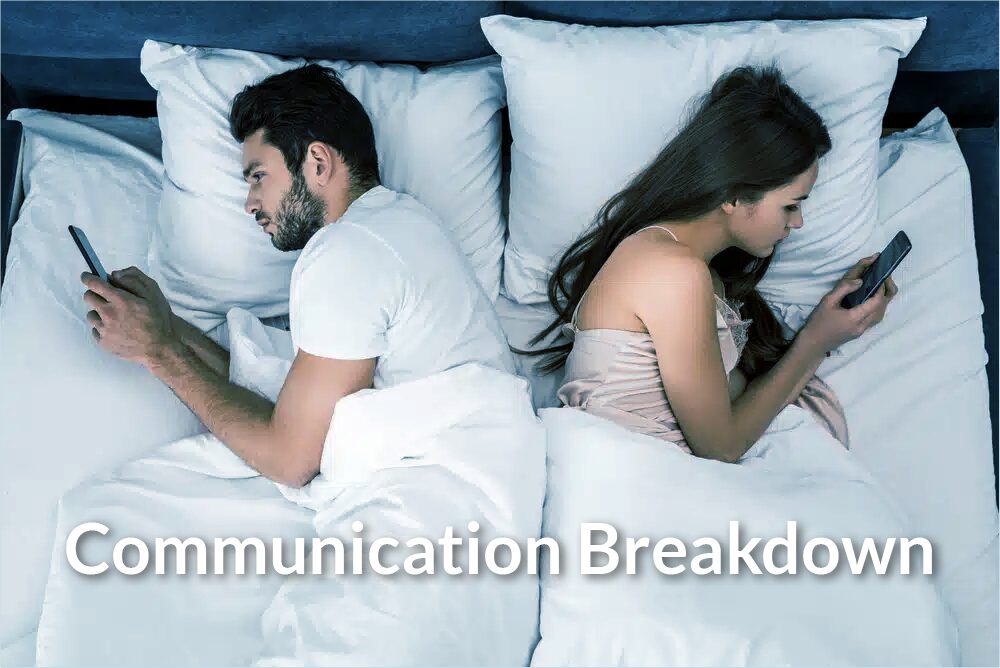
Addiction can have a detrimental effect on communication, potentially resulting in tension, confusion, and discord. Poor communication skills and misunderstandings between partners can further strain the relationship and hinder the ability to rebuild trust and emotional intimacy.
To overcome these challenges, both partners must work together to improve their communication skills and create an open and honest environment in which they can express their feelings and needs.
Codependency and Enabling in Addictive Relationships
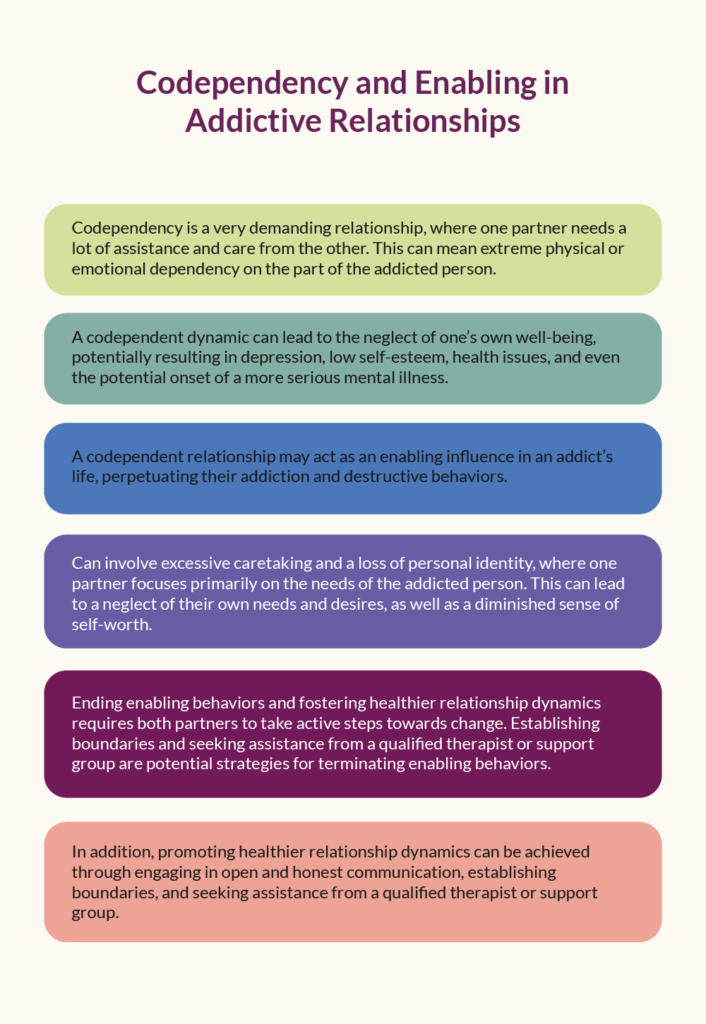
In relationships where addiction is present, it is common for codependency and enabling behaviors to develop. Codependency is a very demanding relationship, where one partner needs a lot of assistance and care from the other. This kind of relationship usually involves extreme physical or emotional dependency on the part of the addicted person. This dynamic can lead to the neglect of one’s own well-being, potentially resulting in depression, low self-esteem, health issues, and even the potential onset of a more serious mental illness.
Furthermore, the codependent relationship can act as an enabling influence in the addict’s life, perpetuating their addiction and destructive behaviors.
Characteristics of Codependent Relationships
Codependent relationships often involve excessive caretaking and a loss of personal identity as one partner focuses primarily on the needs of the addicted person. This can lead to a neglect of their own needs and desires, as well as a diminished sense of self-worth.
Recognizing these characteristics is crucial in addressing codependency and working towards a healthier, more balanced relationship dynamic.
Breaking the Cycle of Enabling
Ending enabling behaviors and fostering healthier relationship dynamics requires both partners to take active steps toward change. Establishing boundaries and seeking assistance from a qualified therapist or support group are potential strategies for terminating enabling behaviors.
In addition, promoting healthier relationship dynamics can be achieved through engaging in open and honest communication, establishing boundaries, and seeking assistance from a qualified therapist or support group.
The Role of Mental Health in Addictive Relationships
The connection between addiction and mental health issues is a crucial factor in understanding the capacity for love in a relationship. Addiction can lead to heightened levels of anxiety and depression in the individual with the addiction, and feelings of powerlessness and being overwhelmed in the other partner.
Mental health issues can impede the ability to form and sustain relationships, as well as difficulty in expressing and comprehending emotions. This can result in a lack of trust and communication, which can have a negative effect on the capacity for love in a relationship.
Co-occurring Disorders
Research has indicated that as much as 50% of individuals with substance use disorders may have a co-occurring mental health disorder. Common co-occurring mental health disorders include depression, anxiety, bipolar disorder, and post-traumatic stress disorder.
These co-occurring disorders can complicate an individual’s ability to manage their addiction and elevate the likelihood of relapse. Therefore, addressing co-occurring mental health disorders is critical for successful addiction treatment.
Addressing Mental Health Needs
For both the addicted person and their partner, addressing mental health needs is essential for fostering a caring and supportive environment within their relationship. Providing access to appropriate treatment, therapy, medication, support networks, and resources can help individuals manage and cope with their mental health challenges, ultimately promoting mental well-being and improving overall quality of life.
Addressing these needs in tandem with addiction treatment can pave the way for a healthier, more loving relationship.
If you or a loved one need help now call 772-774-3872.
Navigating Recovery and Rebuilding Love
Recovery from addiction is a challenging and complex process that requires the support and understanding of both partners. Working together to navigate the recovery process and rebuild love in their relationship is crucial for long-term success.
Addressing relationship issues in recovery can help to avoid potential conflict, which may lead to relapse in drinking or drug use. Involving partners in the treatment process and addressing the underlying issues that contributed to the addiction can help build a stronger foundation for a healthier, more loving relationship.
Involving Partners in Treatment
Involving partners in addiction treatment has numerous benefits. Not only does it provide support for the addicted person throughout their recovery process, but it also helps to address relationship issues that may have contributed to the development of the addiction.
Participating in couples therapy and other support services can help both partners strengthen their communication skills, rebuild trust, and create a more stable and loving environment in which to heal and grow.
Reestablishing Trust and Emotional Intimacy
Once the recovery process has begun, it is essential for couples to work together to rebuild trust and emotional intimacy in their relationship. This can be achieved by focusing on communication, understanding, and support. In addition to seeking professional help, couples can also benefit from joining support groups and engaging in various activities that promote emotional connection and trust-building.
By working together and committing to a healthier, more loving relationship, couples can overcome the challenges of relationships addiction and create a stronger, more fulfilling bond.
Support Resources for Couples Affected by Addiction
There are a variety of resources and support groups available to couples dealing with addiction. These resources can provide invaluable guidance and assistance throughout the recovery process, helping both partners navigate the challenges they face and work towards a healthier, more loving relationship.
From couples therapy to support groups, seeking help and guidance from others who understand the difficulties of addiction can make a significant difference in overcoming these challenges and building a stronger relationship foundation.
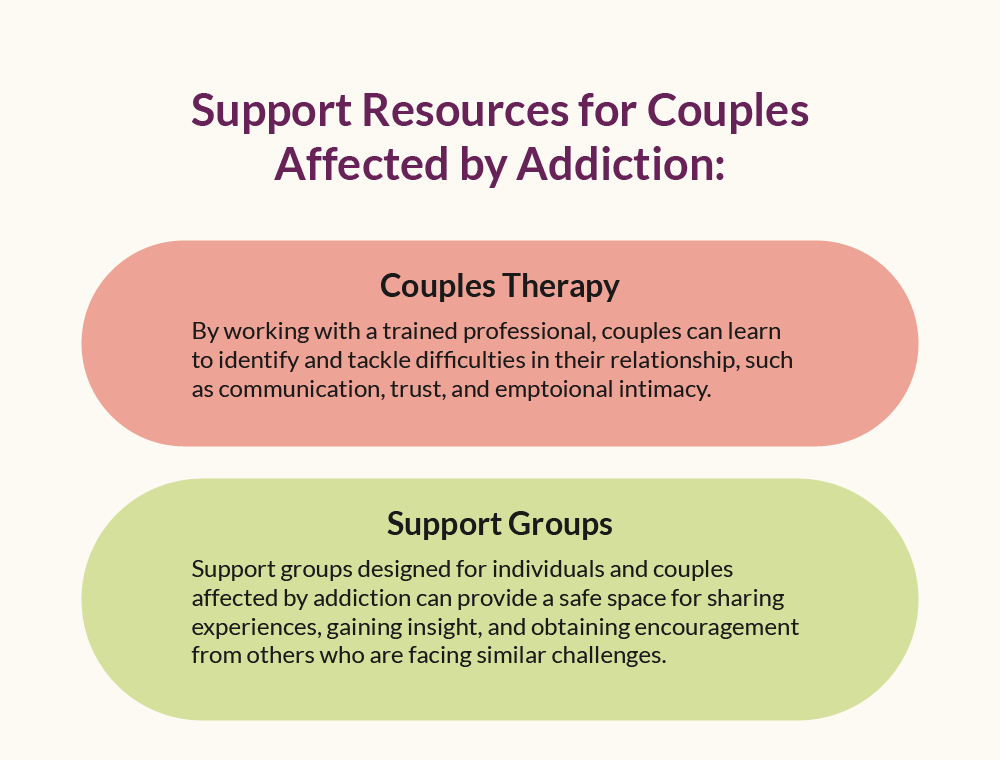
Couples Therapy
Couples therapy can play a vital role in addressing relationship issues related to addiction. By working with a trained professional, couples can learn to identify and tackle difficulties in their relationship, such as communication, trust, and emotional intimacy. The therapist will also assist the couple in constructing plans to more effectively manage their relationship and strive for a healthier and more satisfying relationship.
Incorporating couples therapy and family therapy into the recovery process can be valuable tools for both partners as they work to rebuild their emotional connection and create a more loving, supportive environment.
Support Groups
Support groups designed for individuals and couples affected by addiction can provide a safe space for sharing experiences, gaining insight, and obtaining encouragement from others who are facing similar challenges. These groups can help alleviate feelings of isolation and provide valuable resources for coping with the difficulties associated with addiction and recovery.
By participating in support groups, couples can strengthen their support system and enhance their ability to navigate the recovery process together, ultimately working towards a healthier, more loving relationship.
If you or a loved one need help now call 772-774-3872.
Summary
Facing the hard truth about addiction and its impact on love, trust, and communication in relationships can be overwhelming and disheartening. However, by understanding the typical addict behavior in relationships, the complexities of addiction, codependency, and mental health issues, couples can work together to rebuild their emotional connection and create a healthier, more loving relationship. By seeking professional help, participating in support groups, and committing to open communication and understanding, couples can overcome the challenges of addiction and forge a stronger, more fulfilling bond.
Frequently Asked Questions
How can addiction affect trust and communication in a relationship?
Addiction can lead to tension, arguments, and even abuse in a relationship, hurting trust and communication. The addicted person may also lie to protect their partner or use drugs without judgment, further eroding any trust that is present.
What is codependency in a relationship with an addict?
Codependency in a relationship with an addict is a situation where one partner has strong physical or emotional needs and their partner devotes much of their time to addressing those needs.
This can lead to a situation where the codependent partner is unable to focus on their own needs and desires, and instead puts all of their energy into helping the addict. This can be damaging to both partners, as the codependent partner may become resentful.
What are the benefits of involving partners in addiction treatment?
Involving partners in addiction treatment can be beneficial as it provides support for the addicted person throughout their recovery process, helping them address any underlying issues which may have contributed to their addiction.
Partners can provide emotional support, help with practical tasks, and provide accountability to ensure the addicted person is staying on track with their recovery goals. They can also help identify any potential triggers and provide guidance on how to manage them.
How can couples work together to navigate the recovery process and rebuild love in their relationship?
Couples can rebuild their love by participating in couples therapy, support groups, and activities that foster trust and emotional connection.
These activities can help couples reconnect and rebuild their relationship. They can learn to communicate better, understand each other’s needs, and develop a stronger bond.
Couples therapy can provide a safe environment.
What resources are available to couples affected by addiction?
Couples affected by addiction can find help in the form of individual and group counseling as well as support groups, providing necessary support and guidance throughout their journey to recovery.
These services can help couples better understand the addiction, learn how to cope with it, and develop strategies to prevent relapse. They can also provide a safe space to discuss their feelings and experiences, and to receive emotional support from others who are going through similar experiences.


